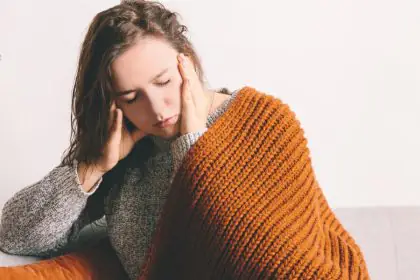Stress and anxiety are common problems that affect many people in today’s fast-paced and demanding world.
They can cause physical and mental health issues, such as headaches, insomnia, depression, and heart disease.
Fortunately, there are many natural ways to cope with stress and anxiety that can improve your wellbeing and happiness.
In this blog, we will explore 15 effective ways to relieve stress and anxiety, based on scientific research and personal experience.
1. Spend time in nature
Nature has a calming and healing effect on our mind and body.
Studies have shown that spending time in green spaces or bringing nature into your everyday life can reduce feelings of anger, stress and anxiety.
It can also improve your mood, self-esteem, and physical health.
Some of the ways you can connect with nature to release stress and anxiety:
- Go for a walk, hike, or bike ride in a park, forest, or beach.
- Grow plants, flowers, or vegetables in your garden or balcony.
- Visit a local farm, zoo, or wildlife sanctuary and interact with animals.
- Join a conservation or environmental group and volunteer for a green cause.
- Use natural materials and colors to decorate your home or office.
2. Exercise regularly
Exercise is one of the best ways to combat stress and anxiety.
It releases endorphins, which are natural chemicals that make you feel good and reduce pain.
It also helps you burn off excess energy, relax your muscles, and improve your sleep quality.
Exercise can also boost your confidence, self-image, and social skills.
Some of the benefits of exercise for relieving stress and anxiety are:
- It can reduce symptoms of depression, stress and anxiety.
- It can prevent or treat anxiety disorders, such as panic disorder and social anxiety disorder.
- It can help you cope with stressful situations, such as quitting smoking or facing a challenge.
The recommended amount of exercise for adults is at least 150 minutes of moderate-intensity or 75 minutes of vigorous-intensity physical activity per week.
You can choose any type of exercise that you enjoy and suits your fitness level, such as:
- Jogging, swimming, cycling, or dancing.
- Playing sports, such as tennis, soccer, or basketball.
- Doing yoga, pilates, or tai chi.
- Lifting weights, doing push-ups, or using resistance bands.
3. Meditate daily
Meditation is a practice that involves focusing your attention on a single object, thought, or sensation, such as your breath, a mantra, or a sound.
Meditation can help you calm your mind, reduce negative emotions, and enhance your awareness and concentration.
Meditation can also lower your blood pressure, heart rate, and cortisol levels, which are associated with stress and anxiety.
Some of the benefits of meditation to combat stress and anxiety are:
- It can reduce anxiety and stress levels.
- It can improve your mood and happiness.
- It can increase your self-compassion and empathy.
- It can help you cope with trauma, pain, and illness.
There are many types of meditation, such as mindfulness, transcendental, and loving-kindness.
You can try different methods and find the one that works best for you.
You can also use apps, videos, or books to guide you through the process.
The recommended amount of meditation for beginners is 10 to 20 minutes per day.
You can meditate in any quiet and comfortable place, such as:
- Your bedroom, living room, or balcony.
- A park, garden, or beach.
- A meditation center, temple, or church.
4. Practice relaxation techniques
Relaxation techniques are methods that help you release tension and relax your body and mind.
They can also help you cope with negative emotions, stress and anxiety.
Some of the common relaxation techniques are:
Progressive muscle relaxation.
This involves tensing and relaxing different muscle groups in your body, starting from your feet and moving up to your head.
This can help you become more aware of your body and ease muscle tension5.
Deep breathing: This involves taking slow and deep breaths, filling your lungs with air and exhaling fully.
This can help you lower your heart rate, blood pressure, and stress hormones5.
Visualization: This involves imagining a peaceful and pleasant scene, such as a beach, a forest, or a mountain.
This can help you distract yourself from negative thoughts and feelings and create a sense of calmness and happiness.
You can practice relaxation techniques whenever you feel stressed or anxious, or as part of your daily routine.
You can also use apps, videos, or audio recordings to guide you through the steps.
You can practice relaxation techniques in any place where you can be comfortable and undisturbed, such as:
- Your bed, couch, or chair.
- A quiet corner, closet, or bathroom.
- A car, bus, or train.
5. Write in a journal
Writing in a journal is a way of expressing your thoughts and feelings on paper.
Writing can help you process your emotions, gain insight, and find solutions to your problems.
Writing can also help you release pent-up stress and anxiety and improve your mental health.
Some of the benefits of writing for mental health are:
- It can reduce symptoms of anxiety and depression.
- It can improve your mood and wellbeing.
- It can enhance your memory and cognitive function.
- It can boost your immune system and physical health.
- There are no rules or guidelines for writing in a journal.
You can write about anything that matters to you, such as:
- Your daily experiences, challenges, and achievements.
- Your goals, dreams, and plans for the future.
- Your thoughts, feelings, and opinions on various topics.
- Your gratitude, appreciation, and compliments for yourself and others.
You can write in a journal whenever you feel like it, or set a regular time and place for it.
You can use a notebook, a computer, or a phone to write.
You can also use prompts, questions, or themes to inspire you.
You can keep your journal private, or share it with someone you trust.
6. Eat a balanced diet
Eating a balanced diet is important for your physical and mental health and to reduce your stress and anxiety.
Eating well can provide your body with the nutrients it needs to function properly and prevent diseases.
Eating well can also affect your mood, energy, and cognition.
Some of the effects of eating well on mental health are:
- It can reduce level of stress and anxiety levels.
- It can prevent or treat mental health problems, such as depression, ADHD, and schizophrenia.
- It can improve your brain function and performance.
- It can enhance your self-esteem and body image.
A balanced diet consists of a variety of foods from different food groups, such as:
Fruits and vegetables: These provide vitamins, minerals, antioxidants, and fiber that can protect your cells and organs from damage and inflammation.
Aim for at least five portions of fruits and vegetables per day.
Whole grains: These provide carbohydrates, fiber, and B vitamins that can supply your brain with energy and regulate your blood sugar levels.
Choose whole grains over refined grains, such as brown rice, oats, and whole wheat bread7.
Protein: These provide amino acids, which are the building blocks of your brain chemicals, such as neurotransmitters and hormones.
Choose lean protein sources, such as fish, poultry, eggs, beans, and nuts.
Healthy fats: These provide essential fatty acids, such as omega-3 and omega-6, that can support your brain structure and function.
Choose healthy fats over saturated and trans fats, such as olive oil, avocado, and seeds.
Dairy products: These provide calcium, protein, and probiotics that can strengthen your bones, muscles, and gut health.
Choose low-fat or fat-free dairy products, such as milk, yogurt, and cheese.
In addition to eating a balanced diet, you should also:
Don’t forget to drink plenty of Water: Water is essential for your body and brain to function properly.
It can also help you flush out toxins and prevent dehydration, which can cause headaches, fatigue, and irritability.
Aim for at least eight glasses of water per day.
Limit caffeine and alcohol: Caffeine and alcohol are stimulants that can affect your nervous system and mood.
They can also interfere with your sleep quality and quantity, which can affect your mental health.
Limit your intake of caffeine and alcohol, especially in the evening.
Avoid processed and junk foods: Processed and junk foods are high in sugar, salt, fat, and additives that can harm your body and brain.
They can also cause blood sugar spikes and crashes, which can affect your mood and energy.
Avoid or limit your intake of processed and junk foods, such as candy, chips, soda, and fast food.
7. Get enough sleep
Sleep is vital for your physical and mental health.
Sleep can help your body and brain repair and regenerate, and prepare for the next day.
Sleep can also affect your mood, memory, and learning.
Some of the benefits of sleep for mental health are:
- It can reduce stress and anxiety levels.
- It can prevent or treat mental health problems, such as depression, bipolar disorder, and PTSD7.
- It can improve your cognitive function and performance.
8. Use natural remedies
There are many natural remedies that can help you cope with stress and anxiety. Some of them are:
Chamomile: Chamomile is an herb that has soothing and relaxing properties.
It can help you calm your nerves, reduce insomnia, and ease digestive problems.
You can drink chamomile tea, take chamomile supplements, or use chamomile essential oil.
Lavender: Lavender is a plant that has a pleasant and calming scent.
It can help you reduce anxiety, improve your mood, and promote sleep.
You can inhale lavender oil, use lavender products, or grow lavender in your home1.
Lemon balm: Lemon balm is an herb that has a refreshing and uplifting effect.
It can help you reduce stress, anxiety, and depression.
You can drink lemon balm tea, take lemon balm capsules, or use lemon balm cream1.
Valerian: Valerian is a root that has sedative and anti-anxiety properties.
It can help you relax your muscles, lower your blood pressure, and improve your sleep quality.
You can take valerian supplements, drink valerian tea, or use valerian tincture.
Before using any natural remedies, you should consult your doctor, especially if you have any medical conditions or take any medications.
You should also follow the dosage instructions and be aware of the possible side effects and interactions.
9. Try CBD oil
CBD oil is a product that contains cannabidiol (CBD), a compound derived from the cannabis plant.
CBD is not psychoactive, meaning it does not make you high or impair your cognition.
CBD can interact with your endocannabinoid system, which regulates various functions in your body, such as mood, pain, and stress and anxiety.
CBD oil may help you reduce stress and anxiety by:
Modulating your serotonin levels:
Serotonin is a neurotransmitter that affects your mood, happiness, and well-being.
Low serotonin levels are linked to anxiety and depression.
CBD may increase your serotonin levels by activating your serotonin receptors2.
Reducing your cortisol levels. Cortisol is a hormone that is released in response to stress.
High cortisol levels can cause anxiety, insomnia, and inflammation.
CBD may lower your cortisol levels by inhibiting your cortisol secretion.
Enhancing your endocannabinoid tone.
Endocannabinoids are molecules that your body produces to regulate your endocannabinoid system. They can affect your mood, memory, and cognition.
CBD may boost your endocannabinoid tone by preventing your endocannabinoids from being broken down2.
CBD oil is available in various forms, such as tinctures, gummies, capsules, and topicals.
You can choose the form that suits your preference and needs. You can also choose the potency and flavor of your CBD oil.
However, you should be careful about the quality and safety of your CBD oil.
You should look for products that are:
- Made from organic and non-GMO hemp.
- Extracted using CO2 or ethanol methods.
- Tested by third-party labs for potency and purity.
- Free of pesticides, solvents, and heavy metals.
- Labeled with accurate and transparent information.
You should also consult your doctor before using CBD oil, especially if you have any medical conditions or take any medications.
You should also start with a low dose and gradually increase it until you find the optimal dose for you.
You should also monitor your reactions and adjust your dose accordingly.
10. Spend time with animals
Animals can be great companions and sources of comfort for people who suffer from stress and anxiety.
Animals can provide you with:
Unconditional love and acceptance.
Animals do not judge you or criticize you. They love you for who you are and make you feel valued and appreciated.
Emotional support and comfort.
Animals can sense your emotions and respond to them. They can cuddle with you, lick you, or nuzzle you when you are feeling sad or anxious.
They can also make you laugh and smile with their antics and expressions.
Social interaction and connection.
Animals can help you break the ice and start conversations with other people.
They can also help you bond with other animal lovers and join animal-related communities and activities.
Physical activity and stimulation.
Animals can motivate you to exercise and play with them.
They can also help you explore new places and experiences with them.
Studies have shown that spending time with animals can lower your blood pressure, heart rate, and cortisol levels, and increase your oxytocin, dopamine, and serotonin levels.
These are all beneficial for your physical and mental health.
Some of the ways you can spend time with animals are:
- Adopt or foster an animal from a shelter or rescue group.
- Volunteer at an animal shelter or sanctuary.
- Visit a pet store, zoo, or aquarium.
- Join a pet therapy program or service.
11. Listen to music
Music is a powerful tool that can affect your mood, emotions, and brain function.
Music can help you relax, distract, and cope with stress and anxiety.
Some of the benefits of music for mental health are:
- It can reduce stress and anxiety levels.
- It can improve your mood and happiness.
- It can enhance your memory and learning.
- It can stimulate your creativity and imagination.
There are many types of music that can help you relieve stress and anxiety, such as:
Classical music
Classical music can have a soothing and calming effect on your mind and body.
It can lower your blood pressure, heart rate, and cortisol levels, and increase your alpha brain waves, which are associated with relaxation and focus.
Nature sounds
Nature sounds can mimic the natural environment and create a sense of harmony and peace.
They can also mask unwanted noises and help you sleep better. You can listen to sounds of water, birds, wind, or rain.
Binaural beats
Binaural beats are sounds that have different frequencies in each ear.
They can induce different brain states, such as relaxation, meditation, or sleep.
You can listen to music in any place where you can be comfortable and enjoy it, such as:
- Your bedroom, living room, or bathroom.
- A car, bus, or train.
- A park, garden, or beach.
12. Read a book
Reading a book is a great way to escape from reality and immerse yourself in a different world.
Reading can help you relax, distract, and cope with stress and anxiety.
Some of the benefits of reading for mental health are:
- It can reduce stress and anxiety levels.
- It can improve your mood and happiness.
- It can enhance your cognitive function and performance.
- It can increase your empathy and social skills.
There are many genres and topics of books that can help you relieve stress and anxiety, such as:
Fiction: Fiction can stimulate your imagination and creativity and transport you to a different time and place.
You can choose from various genres, such as fantasy, romance, thriller, or comedy.
Non-fiction: Non-fiction can provide you with information and knowledge and inspire you to learn and grow.
You can choose from various topics, such as history, science, biography, or self-help.
Poetry: Poetry can express your emotions and feelings and connect you with the author and other readers.
You can choose from various styles, such as sonnet, haiku, or free verse.
You can read a book whenever you feel stressed or anxious, or as part of your daily routine.
You can also use apps, websites, or libraries to find the book that works best for you.
13. Watch a movie
Watching a movie is a fun and entertaining way to unwind and relax.
Watching a movie can help you relax, distract, and cope with stress and anxiety.
Some of the benefits of watching a movie for mental health are:
- It can reduce stress and anxiety levels.
- It can improve your mood and happiness.
- It can enhance your memory and learning.
- It can stimulate your creativity and imagination.
There are many genres and themes of movies that can help you relieve stress and anxiety, such as:
Comedy: Comedy can make you laugh and smile and release endorphins, which are natural chemicals that make you feel good and reduce pain.
You can choose from various types of comedy, such as slapstick, satire, or parody.
Drama: Drama can make you cry and empathize and release oxytocin, which is a hormone that makes you feel connected and loved.
You can choose from various types of drama, such as romance, tragedy, or thriller.
Animation: Animation can make you marvel and wonder and release dopamine, which is a neurotransmitter that makes you feel motivated and rewarded.
You can choose from various types of animation, such as 2D, 3D, or stop-motion.
You can watch a movie whenever you feel stressed or anxious, or as part of your daily routine.
You can also use apps, websites, or streaming services to find the movie that works best for you.
14. Play a game
Playing a game is a fun and engaging way to challenge and stimulate your brain.
It can help you relax, distract, and cope with stress and anxiety.
Some of the benefits of playing a game for mental health are:
- It can reduce stress and anxiety levels.
- It can improve your mood and happiness.
- It can enhance your cognitive function and performance.
- It can increase your social interaction and connection.
There are many types and formats of games that can help you relieve stress and anxiety, such as:
- Board games. Board games can test your logic, strategy, and memory and provide you with a physical and tangible experience. You can choose from various types of board games, such as chess, scrabble, or monopoly.
- Video games. Video games can test your reflexes, skills, and creativity and provide you with a virtual and immersive experience. You can choose from various types of video games, such as action, adventure, or puzzle.
- Card games. Card games can test your luck, bluff, and math and provide you with a simple and portable experience. You can choose from various types of card games, such as poker, blackjack, or solitaire.
You can play a game whenever you have the feeling of stress and anxiety, or as part of your daily routine.
You can also use apps, websites, or consoles to find the game that works best for you.
15. Do something creative
Doing something creative is a rewarding and fulfilling way to express yourself and explore your potential.
Doing something creative can help you relax, distract, and cope with stress and anxiety.
There are many activities and hobbies that can help you do something creative, such as:
- Writing can help you communicate your thoughts and feelings and create your own stories and worlds.
- You can write anything you want, such as poems, stories, essays, or songs.
- Drawing can help you visualize your ideas and emotions and create your own images and designs.
- Cooking can help you experiment with flavors and ingredients and create your own dishes and recipes.
You can do something creative whenever you feel stressed or anxious, or as part of your daily routine.
You can also use apps, websites, or books to find the inspiration and guidance that works best for you.
Conclusion
These are some of the effective ways to relieve stress and anxiety naturally.
You can try one or more of these methods and see what works best for you.
Remember, stress and anxiety are normal and manageable, and you are not alone.
You can always seek help from a professional, a friend, or a family member if you need it.
FAQs
How long does it take to see results when practicing these stress-relief methods?
The time it takes to see results on relieving negative emotions, stress and anxiety.
Some individuals may experience immediate benefits, while others may notice gradual improvements over time.
Consistency in practicing these techniques is key to maximizing their effectiveness.
Can these methods be used as a replacement for professional mental health treatment?
While these methods are helpful for managing everyday stress and anxiety, they are not a substitute for professional mental health treatment.
If you have a diagnosed mental health condition or if your symptoms persist, it’s important to consult with a mental health professional for personalized guidance and support.
Are these techniques suitable for everyone, regardless of age or fitness level?
Yes, the majority of these techniques are adaptable for individuals of all ages and fitness levels.
It’s essential to choose activities that align with your physical capabilities and preferences.
Always consult with a healthcare professional before starting a new exercise or relaxation routine, especially if you have underlying health concerns.
How can I incorporate these stress-relief methods into a busy schedule?
Incorporating these methods into a busy schedule is possible with small adjustments.
For example, you can practice deep breathing during short breaks, engage in a quick outdoor walk, or listen to calming music during daily commute.
Consistency in finding brief moments for these activities can contribute to overall stress reduction.
Are there specific dietary recommendations mentioned in the stress-relief tips?
Yes, maintaining a balanced diet is highlighted as an important factor in stress and anxiety management.
The recommendation includes consuming a variety of fruits, vegetables, whole grains, lean proteins, and healthy fats.
Additionally, staying hydrated by drinking an adequate amount of water is emphasized for overall well-being.
Can these stress-relief methods be combined, or should they be practiced individually?
These methods can be combined to create a personalized stress and anxiety relief routine.
For example, you might choose to meditate before or after exercising, listen to calming music while practicing relaxation techniques, or engage in a creative activity as part of your daily routine.
Experiment with different combinations to find what works best for you.





